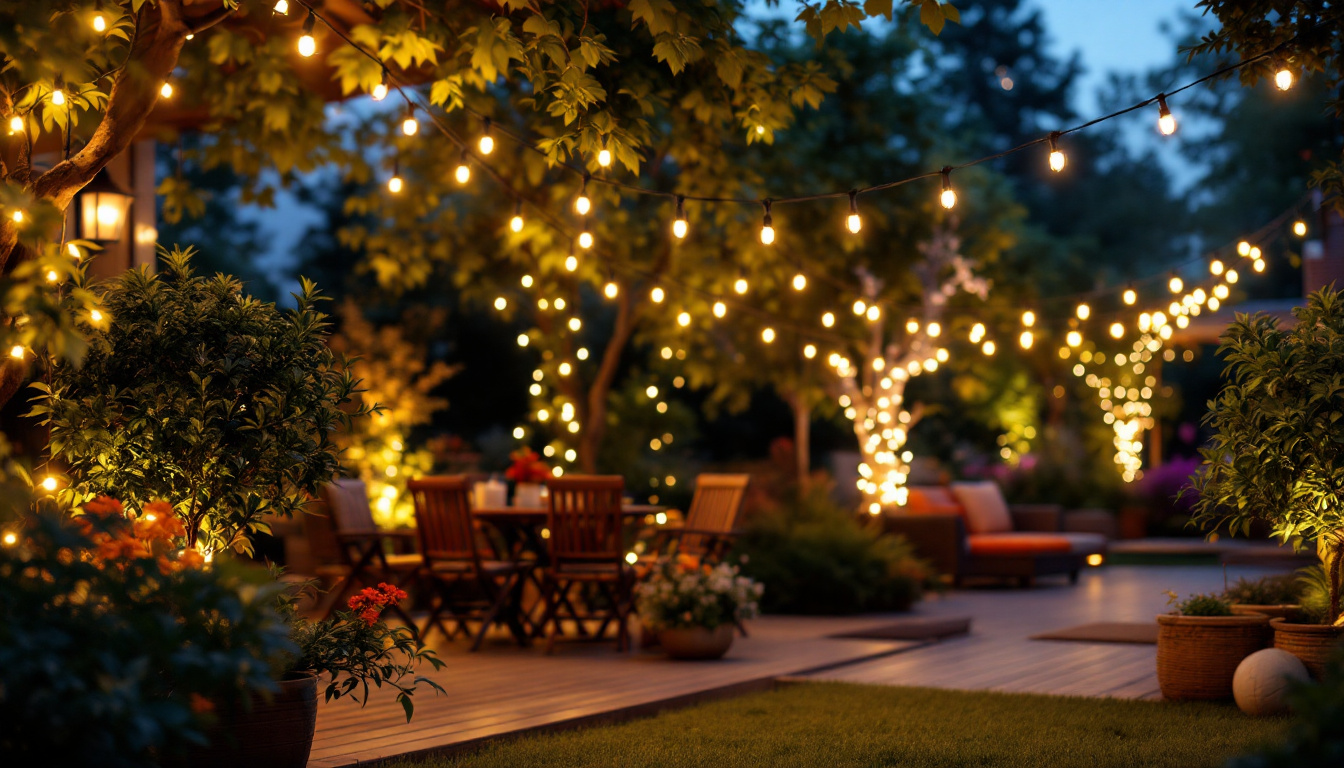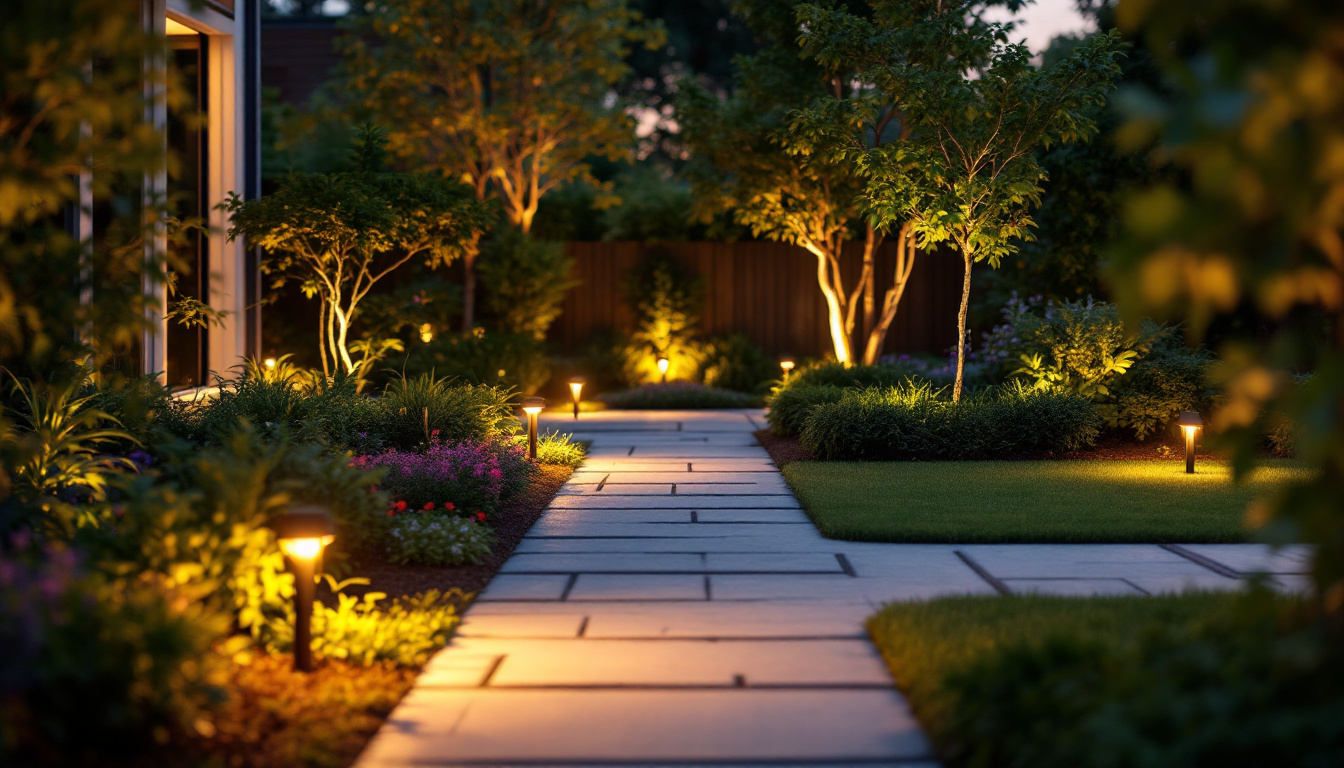
As the demand for sustainable and energy-efficient solutions continues to rise, landscape lighting solar systems have emerged as a transformative option for lighting contractors. These systems not only enhance outdoor aesthetics but also offer significant benefits in terms of cost savings, installation flexibility, and environmental impact. Understanding the implications of solar landscape lighting can help contractors make informed decisions and elevate their projects.
Solar landscape lighting utilizes photovoltaic cells to convert sunlight into electrical energy, powering outdoor lights without the need for traditional wiring. This technology has evolved significantly, leading to more efficient and reliable systems that cater to various landscaping needs. For lighting contractors, this represents an opportunity to diversify their offerings and meet the growing consumer demand for eco-friendly solutions. As more homeowners seek sustainable options, solar landscape lighting not only enhances the aesthetic appeal of properties but also aligns with environmentally conscious practices.
Solar landscape lighting systems typically consist of solar panels, batteries, LED lights, and a controller. The solar panels capture sunlight during the day, converting it into energy stored in batteries. When night falls, the stored energy powers the LED lights, illuminating outdoor spaces without relying on grid electricity. The simplicity of these components allows for easy installation and maintenance, making them an attractive option for contractors. Furthermore, advancements in technology have led to the development of smart solar lights that can be controlled via mobile apps, providing users with the ability to adjust brightness levels and set timers, thus maximizing energy efficiency and convenience.
There are various types of solar landscape lights available, each designed for specific applications. Path lights, spotlights, floodlights, and decorative lights can all be powered by solar energy. Understanding the different types and their applications enables contractors to recommend the best solutions for their clients’ needs, enhancing their service offerings. For instance, path lights are ideal for guiding guests along walkways, while spotlights can highlight architectural features or garden sculptures, creating focal points in the landscape. Additionally, decorative solar lights, such as lanterns or string lights, can add a whimsical touch to outdoor settings, making them perfect for entertaining or creating a cozy atmosphere.
One of the most significant advantages of solar landscape lighting is its cost-effectiveness. With no need for electrical wiring, installation costs are reduced, allowing contractors to complete projects more efficiently. Additionally, solar lights require minimal maintenance, as they are designed to withstand outdoor conditions. This longevity translates to satisfied clients and repeat business. Beyond financial savings, solar landscape lighting also contributes to energy conservation, reducing the carbon footprint of outdoor lighting. Many systems are equipped with motion sensors, which not only enhance security by illuminating areas when movement is detected but also further conserve energy by ensuring lights are only on when needed. As consumers become increasingly aware of their environmental impact, the appeal of solar lighting continues to grow, making it a smart choice for modern landscaping projects.
Integrating solar landscape lighting into projects requires a shift in planning and design strategies. Contractors must consider factors such as sunlight exposure, battery capacity, and light placement to ensure optimal performance. This section explores how these considerations can influence project outcomes.
Conducting a thorough site assessment is crucial for determining the effectiveness of solar landscape lighting. Factors such as tree cover, building shadows, and the orientation of the property can significantly impact sunlight exposure. Lighting contractors must evaluate these elements to ensure that solar lights receive adequate sunlight throughout the day, maximizing their efficiency at night.
When designing a landscape lighting plan, contractors must balance aesthetics with functionality. Solar lights come in various styles, allowing for creative design possibilities. However, it is essential to consider the intended use of the space. For example, path lights should be placed to ensure safety and visibility, while decorative lights can enhance the ambiance of outdoor gatherings. Striking the right balance can lead to stunning results that satisfy clients’ desires.
Clients may have varying expectations regarding the brightness and duration of solar landscape lighting. Educating clients about the capabilities and limitations of solar technology is essential. Setting realistic expectations can prevent misunderstandings and ensure that clients are satisfied with the final results. Providing clear information about the performance of solar lights during different seasons can also help manage client expectations effectively.
While solar landscape lighting offers many advantages, installation requires careful consideration to ensure optimal performance. This section outlines key factors that contractors should keep in mind during the installation process.
The placement of solar lights is critical for their effectiveness. Contractors should position lights in areas that receive direct sunlight for most of the day. Avoiding shaded spots and ensuring that solar panels are unobstructed will help maximize energy absorption. Additionally, lights should be placed at appropriate heights to ensure adequate illumination of pathways, gardens, or other features.
Battery life is a crucial aspect of solar landscape lighting systems. Contractors must choose high-quality batteries that can withstand outdoor conditions and provide sufficient power for the desired duration. Regular maintenance, such as cleaning the solar panels and checking battery connections, will ensure that the lights continue to function optimally. Educating clients about maintenance requirements can enhance customer satisfaction and prolong the lifespan of the lighting systems.
Innovations in smart technology have also made their way into solar landscape lighting. Some systems now offer features such as motion sensors, timers, and remote control capabilities. Incorporating smart technology into solar lighting projects can enhance functionality and provide added convenience for clients. Lighting contractors should stay informed about these advancements to offer cutting-edge solutions that meet modern consumer demands.
As sustainability becomes a priority for many homeowners, the environmental benefits of solar landscape lighting cannot be overlooked. This section delves into how these systems contribute to eco-friendly practices and align with the values of environmentally conscious clients.
Solar landscape lighting significantly reduces reliance on fossil fuels, contributing to a lower carbon footprint. By harnessing renewable energy from the sun, these systems help decrease greenhouse gas emissions associated with traditional lighting methods. For contractors, promoting the environmental benefits of solar lighting can resonate with clients who prioritize sustainability in their purchasing decisions.
Properly designed solar landscape lighting can also support local biodiversity. By using warm-colored LED lights and minimizing light pollution, contractors can create outdoor spaces that are more inviting to wildlife. This approach not only enhances the beauty of the landscape but also promotes ecological balance, appealing to environmentally conscious clients.
While solar landscape lighting offers numerous advantages, there are challenges that contractors may encounter. Identifying these challenges and exploring potential solutions can help ensure successful project execution.
Weather variability can impact the performance of solar landscape lighting. Extended periods of cloudy or rainy weather may reduce the amount of sunlight that solar panels receive, affecting battery charging and light output. Contractors can address this challenge by recommending systems with larger battery capacities or hybrid options that incorporate traditional power sources for backup.
Although solar landscape lighting can reduce installation costs, the initial investment may still be higher than traditional lighting systems. Contractors should emphasize the long-term savings associated with solar lighting, including reduced energy bills and lower maintenance costs. Providing clients with a clear breakdown of potential savings can help justify the initial expenditure.
Many clients may not fully understand how solar landscape lighting works or its benefits. Lighting contractors play a vital role in educating clients about the technology, addressing misconceptions, and providing clear information on performance expectations. This education can foster trust and lead to more informed purchasing decisions.
The landscape lighting industry is continually evolving, and solar technology is at the forefront of these changes. Staying informed about emerging trends can help contractors remain competitive and meet the needs of their clients.
As solar technology continues to advance, improvements in efficiency, battery life, and design are expected. Innovations such as flexible solar panels and integrated smart technology will likely become more prevalent, allowing for even greater versatility in landscape lighting applications. Contractors should keep an eye on these advancements to offer the latest solutions to their clients.
The integration of solar landscape lighting with smart home systems is another trend gaining traction. Consumers are increasingly looking for seamless automation and control over their outdoor lighting. Contractors who can provide solutions that integrate with existing smart home technologies will likely find a competitive edge in the market.
As homeowners seek personalized outdoor spaces, the demand for customizable solar landscape lighting options is expected to grow. Contractors who can offer a range of styles, colors, and features will be better positioned to meet diverse client preferences. Emphasizing aesthetic customization can enhance the appeal of solar lighting solutions.
Solar landscape lighting represents a significant opportunity for lighting contractors to enhance their projects while meeting the growing demand for sustainable solutions. By understanding the technology, addressing installation considerations, and staying informed about industry trends, contractors can successfully integrate solar lighting into their offerings. As clients increasingly prioritize eco-friendly options, embracing solar landscape lighting can lead to increased satisfaction and long-term success in the competitive lighting market.
Ready to bring the benefits of solar landscape lighting to your clients? At LumenWholesale, we provide lighting contractors with the highest quality, spec-grade solar lighting products at unbeatable wholesale prices. Our commitment to excellence ensures that you have access to the most reliable and high-performing lighting solutions for your projects. Plus, with free shipping on bulk orders, you can stock up on premium lighting without the worry of hidden fees. Elevate your lighting projects while enjoying the best value in the industry. Discover wholesale lighting at the best value today and light up your next project with confidence.

Discover essential tips for lighting contractors to enhance outdoor spaces with string lighting.

Discover the essential checklist for lighting contractors when installing dusk to dawn LED lights.

Discover essential insights into LED recessed lighting that every lighting contractor should know.

Discover how solar-powered garden lamps are revolutionizing the lighting industry for contractors.